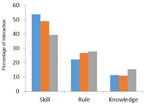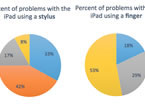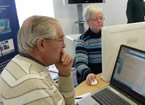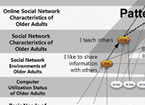Articles about Older adults
The Importance of Designing for the Elderly in a Post-COVID World

One major impact of COVID-19 has been the rapidly rising number of older adults using the internet to work, shop, engage in social activities, and stay connected to family and friends. Many in this demographic, while they have real-world knowledge and experiences, may have challenges using online technologies and mobile devices. Hossein Raspberry provides insights on demystifying inclusive design and driving accessibility design in technology. [Read More]
Activism and COVID-19: Older Southeast Asian Women Embracing Technology

A study describing how older women in Southeast Asia have used technology to spread positivity and creativity during COVID-19. [Read More]
Online Banking for Everyone: Designing for the Aging Brain

Designing for the aging brain or for those with little computer experience requires strictly defining the website functionality, clear workflows, and minimal page distractions. [Read More]
Designing for Vulnerable Users: Illustrations (May) Help Understand Complex Health Websites

Illustrations have the potential to aid in understanding complex health information, but using images effectively requires testing to tailor them to the needs of a wide variety of users. [Read More]
Future Proofing Tomorrow’s Technology: UX for an Aging Population

Based on an analysis of current research, the framework presented can be used as a benchmarking or scoping tool in thinking about the design of assistive technologies that particularly consider older people’s needs. [Read More]
Online Healthcare: Designing Senior-Friendly Privacy

Challenges in creating an online service experience at Philips Home Monitoring for senior users included privacy, user experience, legacy system constraints, and communication. [Read More]
Marking Your Ballot on an iPad: Challenges for Older Adults

Can older adults use iPads for critical tasks like voting? Residents in long-term care facilities are willing to try, but have trouble with touch interaction. [Read More]
Never Too Old: Incorporating Digital Technologies into the Lives of Older Persons

We need to learn how older people use technology to determine when and how to implement accessibility features rather than always seeking a “special” solution. [Read More]
Social Network Sites for Older Adults: Online User Experience for Korean Seniors

Designing social networking systems which meet the needs of current seniors will enable them to use these systems to improve their quality of life. [Read More]
What Do We Know about Older Users? How Old is Old?

Usability professionals have many of the same preconceptions about aging and technology use as those exhibited by people in other professions. [Read More]
The Aging Brain: At the Crossroads of Attention and Memory

Although slowed with aging, difficulties in suppressing irrelevant information, affecting attention span and memory retention, are found in all age groups. [Read More]
Design for the Aging Brain (Commentary of Dr. Gazzaley’s The Aging Brain)

We need to understand the mechanisms that underlie the physical and mental changes of aging to design products that interface well with older adults' cognitive abilities. [Read More]
Conducting Field Studies with Older Adults Lessons for Recruiting and Testing Older Users

Field testing and field research work especially well with older adults, if you are sensitive to their needs in both the recruiting and data collection process. [Read More]
Designing Spaces for Dementia: An Interview with Terry Carson

An interview with Terry Carson, the owner of residential facilities for people with dementia and Alzheimer's disease. [Read More]
Geographic Orientation & Disorientation: Getting Lost and Getting Found in Real and Information Spaces
To reduce problems of navigational disorientation, incorporate different sets of orientation factors and accommodate the needs and abilities of all users. [Read More]
Web 2.0 for an Older Population: Exploring the Limits

To enable a rapidly aging population with the connected social experiences that younger Web users experience, find balance between replacing and augmenting offline activity. [Read More]
Older Users Online: WAI Guidelines Address the Web Experiences of Older Users
A review of research into overlaps between the accessibility needs of older users and people with disabilities showed that WCAG 2.0 meets most of the identified requirements of older web users. The article introduces the WAI-AGE project. [Read More]
The View from Here: When is Enough Enough?
As we age, we are constantly compromising, and redefining what we view as living. [Read More]
What’s News: Helping Seniors Helps Everybody
With the aging of the baby boomers, product developers are realizing that there’s money to be made by making products more user-friendly to older people. [Read More]
Book Review: Assisted Loving

The book is a consciousness-raiser for family members who are dealing with aging seniors as they enter new phases of their lives. [Read More]
Editor’s Note: Platinum Perspectives on Usability and User Experience
The role of seniors have important implications for the policies and focus of attention for our professional organizations and daily life. [Read More]

